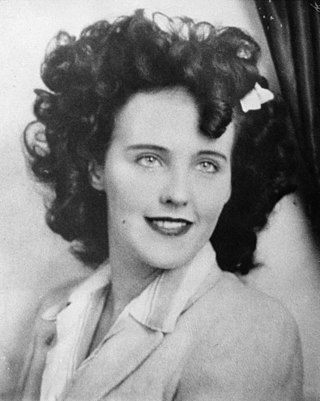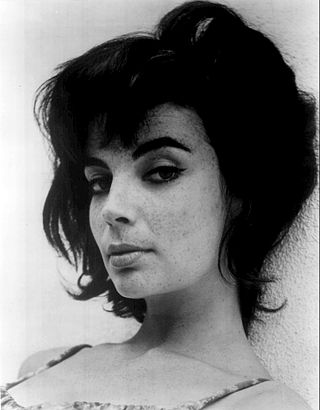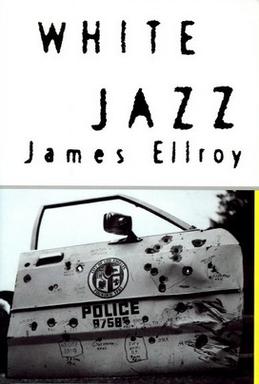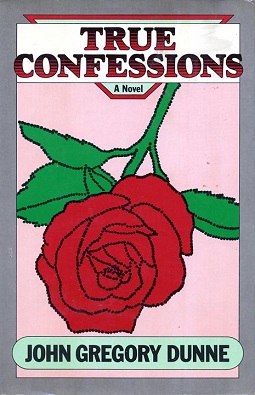
Lee Earle "James" Ellroy is an American crime fiction writer and essayist. Ellroy has become known for a telegrammatic prose style in his most recent work, wherein he frequently omits connecting words and uses only short, staccato sentences, and in particular for the novels The Black Dahlia (1987) and L.A. Confidential (1990).

The Black Dahlia (1987) is a crime fiction novel by American author James Ellroy. Its subject is the 1947 murder of Elizabeth Short in Los Angeles, California, which received wide attention because her corpse was horrifically mutilated and discarded in an empty residential lot. The investigation ultimately led to a broad police corruption scandal. While rooted in the facts of the Short murder and featuring many real-life people, places and events, Ellroy's novel blends facts and fiction, most notably in providing a solution to the crime when in reality it has never been solved. James Ellroy dedicated The Black Dahlia, "To Geneva Hilliker Ellroy 1915-1958 Mother: Twenty-nine Years Later, This Valediction in Blood." The epigraph for The Black Dahlia is "Now I fold you down, my drunkard, my navigator, My first lost keeper, to love and look at later. -Anne Sexton."

Elizabeth Short, known as the Black Dahlia, was an American woman found murdered in the Leimert Park neighborhood of Los Angeles, California, on January 15, 1947. Her case became highly publicized owing to the gruesome nature of the crime, which included the mutilation of her corpse, which was bisected at the waist.

Karyn Kupcinet was an American stage, film, and television actress. She was the daughter of Chicago newspaper columnist and television personality Irv Kupcinet, and the sister of television director and producer Jerry Kupcinet.

Rick Geary is an American cartoonist and illustrator. He is known for works such as A Treasury of Victorian Murder and graphic novel biographies of Leon Trotsky and J. Edgar Hoover.

Harvey Murray Glatman was an American serial killer and rapist during the late 1950s known as the Lonely Hearts Killer or the Glamour Girl Slayer. He would use several pseudonyms, posing as a professional photographer to lure his victims with the promise of a modeling career.

Destination: Morgue! L.A. Tales is a 2004 collection of 12 short works by American crime fiction writer James Ellroy. Eight of the pieces are non-fiction crime reportage or essays that Ellroy originally wrote for GQ magazine, some of which are autobiographical. Also included are three new novellas and one short story previously published in GQ. Earlier GQ pieces by Ellroy can be found in the 1999 collection Crime Wave.

Crime Wave is a 1999 collection of eleven short works of fiction and non-fiction, all originally published in GQ, by American crime fiction writer James Ellroy. The collection, issued as a paperback original, includes a short story ("Hush-Hush"), two novellas, and eight pieces of crime reports, including "Sex, Glitz, and Greed: The Seduction of O. J. Simpson". More of Ellroy's GQ pieces can be found in the collection Destination: Morgue!.

John "Jonathan" Gilmore was an American author and gonzo journalist known for iconoclastic Hollywood memoirs, true crime literature and hard-boiled fiction.

The Black Dahlia is a 2006 American neo-noir crime thriller film directed by Brian De Palma and written by Josh Friedman, based on the 1987 novel of the same name by James Ellroy, in turn inspired by the widely sensationalized murder of Elizabeth Short. Starring Josh Hartnett, Scarlett Johansson, Aaron Eckhart, and Hilary Swank, the film follows two Los Angeles Police Department detectives investigating Short's murder, leading them through a series of shocking discoveries. Mia Kirshner, Mike Starr, Fiona Shaw, John Kavanagh, Rachel Miner, and Rose McGowan appear in supporting roles.

The Big Nowhere is a 1988 crime fiction novel by American author James Ellroy, the second of the L.A. Quartet, a series of novels set in 1940s and 1950s Los Angeles.

White Jazz is a 1992 crime fiction novel by James Ellroy. It is the fourth in his L.A. Quartet, preceded by The Black Dahlia, The Big Nowhere, and L.A. Confidential. James Ellroy dedicated White Jazz "TO Helen Knode." The epigraph for White Jazz is "'In the end I possess my birthplace and I am possessed by its language.' -Ross MacDonald."

Because the Night is a crime fiction novel written by James Ellroy.
The L.A. Quartet is a sequence of four crime fiction novels by James Ellroy set in the late 1940s through the late 1950s in Los Angeles. They are:

Blood's a Rover is a 2009 crime fiction novel by American author James Ellroy. It follows American Tabloid and The Cold Six Thousand as the final volume of Ellroy's Underworld USA Trilogy. A 10,000-word excerpt was published in the December 2008 issue of Playboy. The book was released on September 22, 2009.
Many Black Dahlia suspects, or persons of interest, have been proposed as the unidentified killer of Elizabeth Short, nicknamed the "Black Dahlia", who was murdered in 1947. Many conspiracy theories have been advanced, but none have been found to be completely persuasive by experts, and some are not taken seriously at all.

The Hilliker Curse: My Pursuit of Women is a work of memoir and autobiography by American author James Ellroy published in 2010. Ellroy dedicated the memoir "To Erika Schickel." The epigraph for The Hilliker Curse: My Pursuit of Women is "I will take Fate by the throat. —Ludwig van Beethoven." The unabridged audiobook version is narrated by Ellroy himself.
Frank Girardot is an American author, journalist, victim advocate, and radio host. He is best known for "Name Dropper" his biography of serial imposter Christian Gerhartsreiter. He is communications director for BYD Auto's North American operations, CEO of Pegasus Communications, LLC and the former editor and columnist for the San Gabriel Valley Tribune.

True Confessions is a noir novel by John Gregory Dunne and published in 1977. The novel was inspired by an actual event, the 1947 Black Dahlia murder.
The Black Dahlia: A Crime Graphic Novel is a graphic novel adaptation of James Ellroy's novel The Black Dahlia, by Alexis Nolent and David Fincher, and illustrated by Miles Hyman. Originally published in 2013 in French as Le Dahlia Noir, it was published in English in June 2016, by Archaia Entertainment, a division of Boom! Studios.














